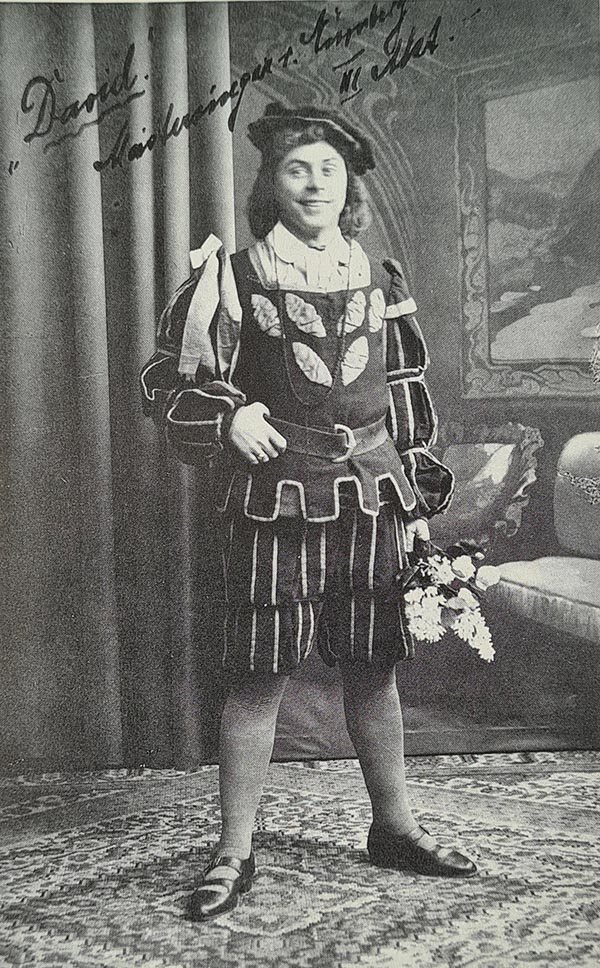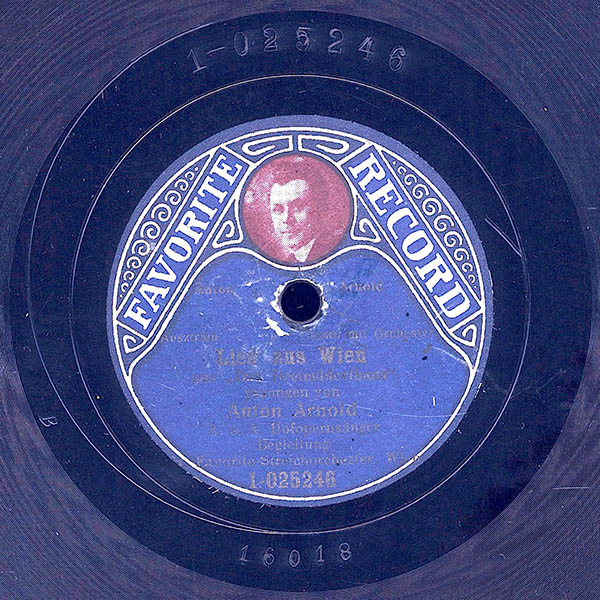Anton Arnold
31 January 1880 Bela Crkva/Weißkirchen – 13 July 1954 Vienna
 Anton Arnold as David in Regensburg
Anton Arnold as David in Regensburg
Anton Arnold was born the son of a watchmaker in what is now Serbia, but was then the Banat region of the
Hapsburg empire, with a large German speaking minority, to which also the Arnolds belonged.
He spent the first few years of his career in the provinces: Olomouc/Olmütz (where he made his debut in 1909),
Teplice/Teplitz-Schönau, Regensburg, Dortmund. Although he initially tried himself in roles like Max and even Stolzing,
he soon specialized in comprimario parts like David, Mime, Missail or Narraboth.
In 1916, he was hired by the Vienna Hofoper (the later Staatsoper), where he would sing the very tiniest parts for roughly
the next 30 years; his most prominent role was Spoletta. In the world premiere of Die Frau ohne Schatten on 10
October 1919, he created Der Bucklige. Kutsch & Riemens say he was retired in 1942 "for political
reasons", without saying which political reasons; however, it wasn't obviously grave – grave political "misbehavior"
was life-threatening under the Nazis, but Arnold continued to sing at the Staatsoper, at least occasionally, until 1946.
After the war, he was for a short time the owner and impresario of the German theater in Timişoara (Romania, and
part of the same Banat region where Arnold had been born).
Picture source and reference 1; reference 2: Kutsch & Riemens

Discography
Favorite, Wien 1916-12
15898-o Liebe im Schnee (Benatzky): Ich will frei sein (w. Grete Holm) 1-29421
15902-o Rose von Stambul (Fall): Fridolinmarsch (w. Grete Holm) 1-29424
15905-o Liebe im Schnee (Benatzky): Im Januar (w. Grete Holm) 1-29425
15907-o Rose von Stambul (Fall): Ein Walzer muss es sein (w. Grete Holm) 1-29426
Favorite, Wien 1917-10, w. salon orchestra "D' Geiger Buam"
15916-o Die Faschingsfee (Kálmán): Susi, nur du 1-x25221
15920-o Die Puppenprinzessin (Richard Fall): Draußen in Sievering 1-x25224
15921-o Liebchen am Dach (Richard Fall): Schön ist wohl eine Rose 1-x25225
15947-o Rose von Stambul (Fall): O Rose von Stambul 1-025226
15951-o Die Faschingsfee (Kálmán): Lieber Himmelvater, sei nicht bös (w. Emma Komlossy) 1-29431
15952-o Faschingsfee (Kálmán): Fräulein, gestatten Sie (w. Emma Komlossy) 1-29432
15953-o Faschingsfee (Kálmán): O holde Faschingsfee (w. Emma Komlossy) 1-29433
15954-o Rose von Stambul (Fall): Sag' Schnuckelchen (w. Emma Komlossy) 1-29434
15955-o Emléksze-e? (Hetényi-Heidelberg?) (as – Hungaricized – "Antal Arnold") 1-025684
Favorite, Wien 1918
16004-o Wo die Lerche singt (Lehár): Fern wie aus vergang'nen Tagen 1-025237
16013-o Hannerl (Schubert/Lafite): Guck' a bisserl (w. Friedl Scarron) 1-29436
16014-o Hannerl (Schubert/Lafite): Ich weiß nur das eine (w. Friedl Scarron) 1-29437
16016-o Wo die Lerche singt (Lehár): Wer ist der Mann mit der schönen Frau? (w. Friedl Scarron) 1-29439
16008-o Lang, lang ist's her (Stolz): Wienerin, Wienerin 1-052241
16011-o Lang, lang ist's her (Stolz): Heute Nacht, wenn die Sterne glüh'n 1-052243
16018-o Dreimäderlhaus (Schubert/Berté): Lied aus Wien 1-025246
16020-o Dreimäderlhaus (Schubert/Berté): Unter einem Fliederbaum (w. male quartet) 1-29441
16021-o Dreimäderlhaus (Schubert/Berté): Ich schnitt es gern in alle Rinden ein 1-025247
Live recording, Staatsoper Wien 1933-02-26 (Arnold as Balthasar Zorn)
Die Meistersinger von Nürnberg (Wagner): Zeuge am Ort, fahret fort ... Abendlich dämmernd
(w. Lorenz, Jerger, Duhan, Gallos, Madin, Fritsch, Tomek, Muzzarelli, Reich, Ettl)
Live recording, Staatsoper Wien 1933-02-26 (Arnold as Vierter Jude)
Salome (Strauss): Ich glaube nicht an Propheten ... Seit dem Propheten Elias
(w. Paalen, Graarud, Gallos, Wernigk, Tomek, Madin)
Live recording, Staatsoper Wien 1936-10-19 (Arnold as Balthasar Zorn)
Die Meistersinger von Nürnberg (Wagner): Was sollte man da noch hören?
(w. Wiedemann, Kalenberg, Destal, Alsen, Monthy, Maikl, Wernigk, Madin, Wolken, Puntschart, Reich, Ettl)
Many thanks to Anton Bieber for providing the rare recording, the label scan and the discography.
|

